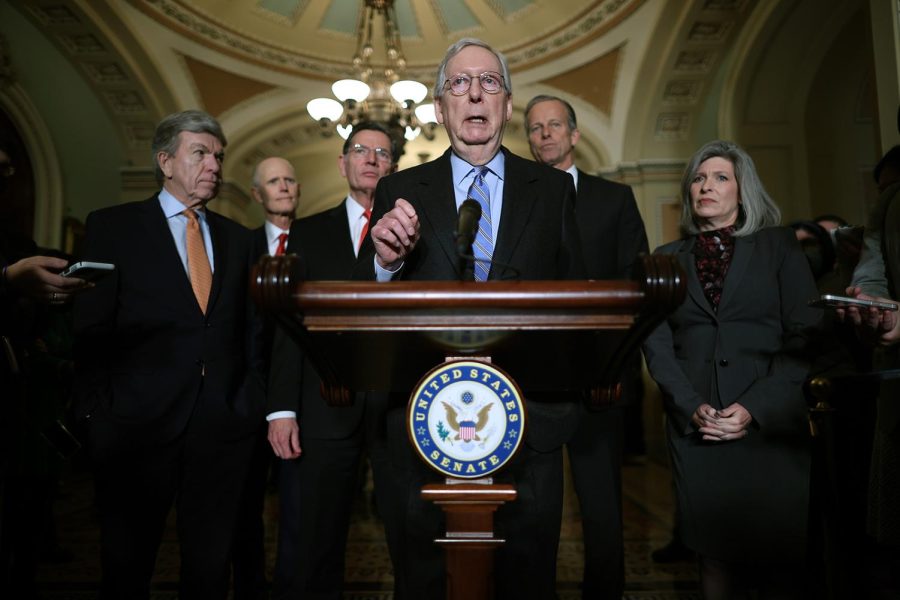Opinion | American democracy lingers on life support | Part II
Photo courtesy of Chip Somodevilla/Getty Images/TNS
Senate Minority Leader Mitch McConnell talks to reporters following the weekly Republican policy at the U.S. Capitol on Nov. 30 in Washington, DC. Senior columnist Andrew Prozorovsky talks about how flawed the American political branches are.
January 18, 2022
In response to Democrats’ persistent attempt to override the filibuster, particularly for the passage of their signature voting rights bills, Senate Minority Leader Mitch McConnell stated, “The Senate isn’t broken and doesn’t need fixing.”
This falsehood espoused disingenuously either in bad faith for political convenience or else willful ignorance, comes from the same man who recently argued, “there is no such thing as a narrow exception (to the filibuster),” after having made, well, a narrow exception to the filibuster for Supreme Court nominees during Donald Trump’s presidency.
Before the 2020 election, I wrote about the debilitated state of American democracy. Before the assault on the Capitol building. Before then-President Trump exhausted his playbook to overturn legitimate election results. He still has not conceded his loss.
Unfortunately, the last year and a half only serve to underscore the significant doom in which America’s political system finds itself embroiled.
All three branches have demonstrated significant strain, which when prolonged, will give to crushing weight.
Get The Daily Illini in your inbox!
The executive branch may be the most obvious. For decades, political scholars have argued the executive branch has amassed too much responsibility and power. President Trump stretched the limits of those powers and clearly demonstrated how executive orders, the bully pulpit and even the Department of Justice can be exploited for shortsighted partisan gain.
Likewise, the Supreme Court has worked tirelessly to delegitimize itself in the past few years.
Justices, namely Justice Samuel Alito, seem far more concerned with their own image and ego rather than the Constitution of the United States. Justice Coney Barrett asserted SCOTUS should not be seen as a partisan institution, while standing in the University of Louisville’s McConnell Center, after having just been introduced by McConnell himself. Justice Neil Gorsuch appeared on “Fox & Friends” to share his judicial philosophies.
These Justices argue the media is misrepresenting SCOTUS and demonizing the court, while again and again rubbing elbows with Republican operatives.
The judicial system has been critically slow to act during Trump’s turbulent presidency and now, during a national health emergency. Trump was granted nearly as many federal court appointments as Obama, who served twice as many terms as president.
The Supreme Court, which will likely remain conservative for a generation, is badly in need of term limits, so that the court’s political balance reliably depends on presidential elections, rather than morbidly awaiting the deaths of justices.
The legislative branch, containing most of America’s noteworthy rank-and-file federal politicians, evinces major issues with the current political atmosphere. The legislative branch is structurally unsound, with the Senate conceding a large advantage to Republicans by design and the House falling ill to gerrymandering and fringe politicians like Representative Marjorie Taylor-Greene.
The honest, good-faith politicians trying to make a difference are outnumbered and often outmaneuvered by corrupt, self-serving politicians spreading bad-faith rhetoric and further destabilizing the system.
Not all politicians in Washington are corrupt, but America surely deserves a better composition of lawmakers.
Arguments in bad faith have become a completely normalized strategy to secure partisan gain.
When Fox News hosts’ text messages on Jan. 6 were made public, it demonstrated how the hosts were privately concerned and sickened by the Jan. 6 riots while peddling a completely different message to their audience, one that downplayed the day’s violence. Their messaging is made in bad faith. Rather than honesty, media pundits and politicians speak in politically-expedient tongues. Rather than seek the truth, they seek confirmation bias. Rather than pursue the common good, they seek “to win.”
America’s political institutions are imperfect. That does not mean that they are worth scrapping entirely. They simply need to adapt to the times. But the biggest flaw in America’s institutions is how they can be held hostage by bad-faith actors and how, to be properly maintained, righteous government officials must be elected.
When the system — as it currently stands — rewards bad behavior, it is a self-reinforcing loop that is not sustainable. They are institutions that, without recognition of their shortcomings and effort expended to fix those shortcomings, cannot last long. Reform the filibuster, pass voting rights. Start there.
Andrew is a senior in LAS.







